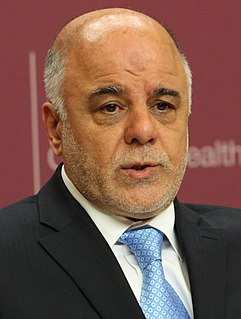A Quote by Haider al-Abadi
It's very important to follow up after the defeat of Daesh militarily. It's not in our interests, nor in the interests of other countries in the region, for them to regroup again.
Related Quotes
I agree with Peter Drucker that the culture and legal systems of the United Statesare especially favorable to shareholder interests, compared to other interests and compared to most other countries. Indeed, there are many other countries where any good going to public shareholders has a very low priority and almost every other constituency stands higher in line.
I hope President [Hamid] Karzai understands that our national security interests don't depend entirely on his decision there whether to allow a recount. Obviously the legitimacy of that government is an important component of it. My point is it shouldn't be the lynch pin for us deciding whether we're going to protect our national security interests in that region.
The good of the family cannot be achieved without consideration of an individual's important interests. If those interests are urgent and weighty, they must become important interests of the family and can sometimes have priority in case of conflict. Sometimes, members must split their differences in compromise. Over time, yielding to others at some times must be balanced against getting priority for one's interests at other times.
With the decline of American interests in the outcome of this region, there is no glue holding it together. And the countries in this region are invented ... The last guarantor of the region's borders was the United States, and the US has basically said "the hell with it." What you're really having is the collapse of nation-states because they're not nations. They're only states.
Where are the leaders who can speak to the idea that it is not alien to American interests, but very much in our socioeconomic interests - not to mention our spiritual health - to integrate immigrants, that our nation functions best when we welcome newcomers and help them participate fully in our society?
With unfailing consistency, U.S. intervention has been on the side of the rich and powerful of various nations at the expense of the poor and needy. Rather than strengthening democracies, U.S. leaders have overthrown numerous democratically elected governments or other populist regimes in dozens of countries ... whenever these nations give evidence of putting the interests of their people ahead of the interests of multinational corporate interests.
































